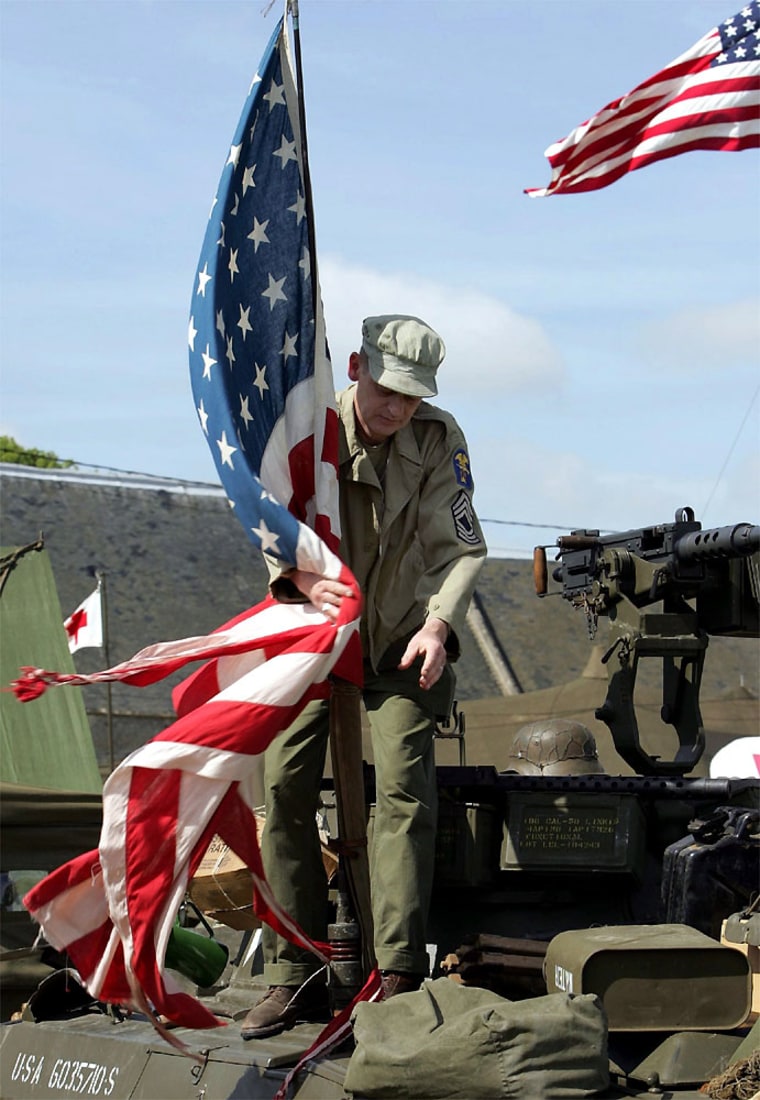If there is one thing President Bush would like to rekindle when he stands beside his European allies for the 60th anniversary of D-Day in Normandy, it is the palpable sense of common cause that united the allies during the Second World War.
Today, the threat of Islamic terrorism seems every bit as menacing as Nazism, yet the Iraq war made clear the allies are far more divided about how and where to confront this evil.
There is no doubt that the Bush speechwriters have looked again at President Reagan's short but powerful speech made at Pointe De Hoc, Normandy, twenty years ago.
Reagan spoke poignantly of the Army Rangers who scaled the 100-foot cliffs in the face of withering attack by Germans above to neutralize the threat facing the troops landing on Omaha Beach.
To the "boys of Pointe du Hoc," he said, "You all knew that some things are worth dying for. One's country is worth dying for, and democracy is worth dying for..."
In President Bush's vision twenty years later, the boys of Iraq are fighting for democracy once again.
If democracy takes root in Iraq, Bush has argued, freedom could very well spread throughout the Middle East and go a long way toward diminishing the threat of terrorism from that part of the world.
But as the president is finding, analogies don't always hold up. Try as he might to link World War Two to the war in Iraq, few make the connection.
Bush may now describe the mission in Iraq as a war of liberation, but it was presented to the American people as a preemptive strike against an enemy bent on attacking the United States with weapons of mass destruction. To date, no WMD's have been found in Iraq.
Beyond that, few remain as optimistic about the country's democratic future.
Even the president has stepped back from the grandiose vision of freedom in Iraq to embrace a more pragmatic goal of enough stability to allow U.S. troops to withdraw and enough democracy to allow a truly representative Iraqi government to prevent the country from being overrun by terrorists. The reality is that whatever emerges there could be decidedly anti-American.
Fence mending mission
The president's European tour, culminating in the ceremony in Normandy, is a fence-mending trip.
Bush comes with the understanding that neither France, nor Germany is about to send troops to Iraq. They were against this war from the start.
Despite calls from Senator John Kerry and other democrats to get NATO to play a leading role in post-June 30th Iraq, NATO — already stretched thin in Afghanistan — is unlikely to play more than a symbolic role.
At Normandy on Sunday, Bush will stand beside the leaders of Europe who attempted to thwart his aims in Iraq.
Despite all of that, the White House knows now more than ever that Iraq's future cannot be managed by the U.S. alone. When the resistance in Iraq proved much stronger than anyone anticipated, the White House changed course and put its faith in the United Nations to rescue a political solution for the country.
Now, Washington understands it's vital for Iraq and the administration's exit strategy that the international community take some ownership of the country that will require a lot of assistance to survive as a young democracy.
To that end the U.S. and Britain are negotiating a new post-occupation U.N. resolution that will, at the insistence of France, Germany, and Russia, give Iraq more explicit authority over combat missions in the country.
The U.S. will lead the multi-national security force, but Bush said this week he will consult closely with the interim Iraqi government. After elections next year, however, the Iraqi government could ask U.S. forces to leave.
No one thinks that will happen, but no one knows exactly how the U.S. and Iraq will resolve disputes over military matters large and small. After all, it's going to be hard for Iraq's leaders to say they have shaken off the occupiers when U.S. soldiers are still patrolling the block looking for bad guys.
What's troubling is that Bush steps back onto the world stage with his visit to Europe at a time when the standing of the United States is at an all-time low.
In much of the world, people fear the United States, but, particularly after the abuse scandal at Abu Ghraib prison, appear to have lost faith in its ideals.
The Iraq war toppled a leader but has not yet won over the hearts and minds of a country's people. Iraqis didn't like Saddam, but it's not clear they like the U.S. as an alternative.
Two decades ago, President Reagan praised the soldiers who landed at Normandy for helping to "liberate a continent, and end a war."
Bush doesn't yet have that kind of clarity about Iraq. In time he might. In time, he may be given credit for setting in motion significant change in a region desperately in need of it. In time we may know whether the Iraq war helped to end the war on terror or only prolonged it.
